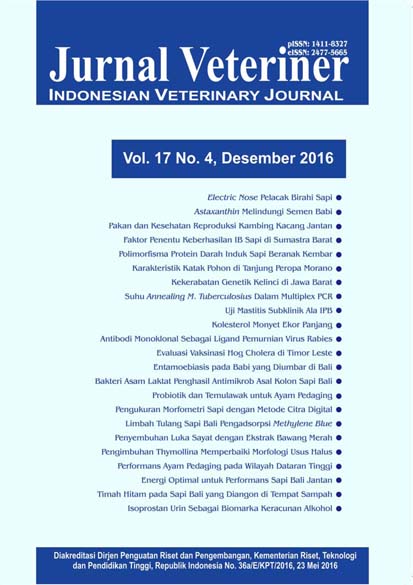Pemanfaatan Electronic Nose sebagai Sensor Kimiawi Urin Guna Melacak Birahi Sapi (ELECTRONIC NOSE AS URINARY CHEMICAL SENSOR FOR DETERMINING ESTROUS PHASE IN CATTLE)
Abstract
The timing of artificial insemination relies largely on behavioral observation of estrus. The problemfaced is that not all cattle shows signs of estrus significantly, which affect the accuracy of insemination,and therefore,the success rate of Artificial Insemination is less than 50%. Recently, the determination ofestradiol levels as an indicator of estrus is done by observation of physical signs and doing ELISA test,which is expensive and provide longer time. In order to solve these problems, a tool estrus detector is madenamely Electronic Nose (EN). Determination of estrus with EN is cheaper because it does not need to usecomplexmaterials, just only use the samples. Mechanism of action of EN is using a sensor that is vaporized,while animals estrus will emit pheromones that are vaporized. Theaim of this study was to determinewhether the stage of estrus can be detected by using EN. Urine of female Ongole Crossbred which maintainedin Kuwang, district of Cangkringan, Yogyakarta, with BCS of 3 was used in this research. The sample wascollected shortly before injection of dinoprost as estrus synchronization then it repeated when cattle got estrus phase. The urinary sample of the estrus cattle was sensitive to methane, propane, butane, whereasin non-estrus cattle, besides the three of these component (methane, propane, butane), sensor was alsocaptured hydrogen sulfide. Furthermore, our electronic nose had been able to distinguish estrus phase andnon-estrus based on domain area.Thus, the Electronic Nose is very prospect used as a detector of estrus incattle. Hydrogen disulfide could possibly be used as an indicator comparison between cow estrus and nonestrus.



















